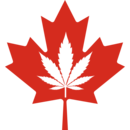
Back Cannabis en Canadá AST Rechtliche Stellung des Cannabisgebrauchs in Kanada German Cannabis en Canadá Spanish Kanep Kanadas Estonian ماریجوانا در کانادا Persian Cannabis au Canada French कॅनडा मध्ये भांग Marathi Cần sa ở Canada Vietnamese 加拿大的大麻 Chinese
| Part of a series on |
| Cannabis in Canada |
|---|
 |
|
|

| Medicinal | Legal |
|---|---|
| Recreational | Legal |
| Hemp | Legal |
Cannabis in Canada is legal for both recreational and medicinal purposes. Cannabis was originally prohibited in 1923 until medicinal use of cannabis was legalized nationwide under conditions outlined in the Marijuana for Medical Purposes Regulations issued by Health Canada, which regulated medical cannabis effective 30 July 2001, and was later superseded by the Access to Cannabis for Medical Purposes Regulations, which also permitted seed, grain, and fibre production under licence by Health Canada.[1][2][3]
In response to popular opinion,[4] the legislation to legalize cannabis for recreational use (Cannabis Act, Bill C-45) was passed by the House of Commons of Canada on 27 November 2017; it passed second reading in the Senate of Canada on 22 March 2018.[5] On 18 June 2018, the House passed the bill with most, but not all, of the Senate's amendments.[6] The Senate accepted this version of the Act the following day.[7] The Cannabis Act took effect on 17 October 2018 and made Canada the second country in the world, after Uruguay, to formally legalize the cultivation, possession, acquisition, and consumption of cannabis and its by-products.[8][9] Canada is the first G7 and G20 nation to do so.[10] This legalization comes with regulation similar to that of alcohol in Canada: age restrictions, limiting home production, distribution, consumption areas and sale times.[11] The process removed cannabis possession for personal consumption from the Controlled Drugs and Substances Act; while implementing taxation and stronger punishments for those convicted of either supplying cannabis to minors or of impairment while driving a motor vehicle.[12]
As of January 2019, online sales of cannabis for recreational use were well underway across Canada, via the provincial or territorial governments. Most provinces also had storefront operations selling cannabis, either operated by the government or private enterprise.[13]
- ^ "Access to Cannabis for Medical Purposes Regulations". laws-lois.justice.gc.ca/. Archived from the original on 19 July 2021. Retrieved 20 March 2017.
- ^ "Industrial Hemp Regulation Program FAQ". Health Canada. November 2012. Archived from the original on 27 September 2018. Retrieved 30 October 2013.
- ^ "Canada's Cannabis Legalization Timeline". nsra-adnf.ca. December 2024. Archived from the original on 30 December 2024. Retrieved 30 December 2024.
- ^ Cain, Patrick (12 October 2016). "Canada will see 900,000 new pot smokers under legalization, poll implies". Global News. Archived from the original on 6 June 2022. Retrieved 4 February 2017.
- ^ Vaughan, Andrew (23 March 2018). "Bill to legalize marijuana passes second reading in Senate as Conservatives drop threat to block it". National Post. The Canadian Press. Retrieved 23 June 2018.
- ^ Anapol, Avery (18 June 2018). "Canada's House of Commons votes to legalize marijuana". The Hill. Archived from the original on 18 June 2018. Retrieved 19 June 2018.
- ^ Scotti, Monique (19 June 2018). "Marijuana legalization Bill C-45 officially passes Senate vote, heading for royal assent". Global News. Archived from the original on 20 June 2018. Retrieved 20 June 2018.
- ^ Sapra, Bani (20 June 2018). "Canada becomes second nation in the world to legalize marijuana". CNN. Archived from the original on 12 February 2019. Retrieved 20 June 2018.
- ^ Tasker, John Paul (20 June 2018). "Trudeau says pot will be legal as of Oct. 17, 2018". CBC News. Archived from the original on 21 June 2018. Retrieved 20 June 2018.
- ^ Ross, Selena (6 June 2018). "All eyes on Canada as first G7 nation prepares to make marijuana legal". The Guardian. Archived from the original on 6 June 2022. Retrieved 10 July 2018.
- ^ "Cannabis Act (S.C. 2018, c. 16)". Justice Canada. Government of Canada. Archived from the original on 25 March 2022. Retrieved 24 November 2018.
- ^ Bronskill, Jim (17 December 2015). "Tax on legalized pot won't be a cash cow: PM". CTV News. The Canadian Press. Archived from the original on 1 June 2022. Retrieved 23 December 2015.
- ^ "Ontario is holding a lottery for cannabis stores on Friday. Here's what the rest of the country tried and how it turned out". Toronto Star. 10 January 2019. Archived from the original on 10 April 2019. Retrieved 11 January 2019.